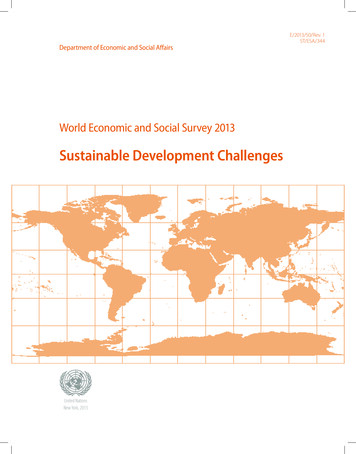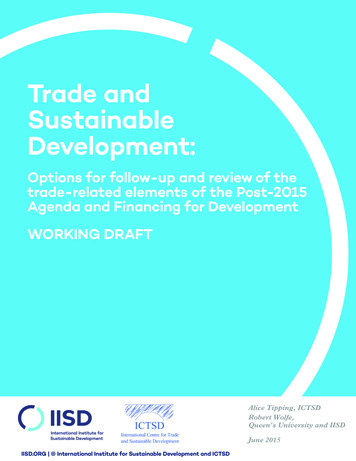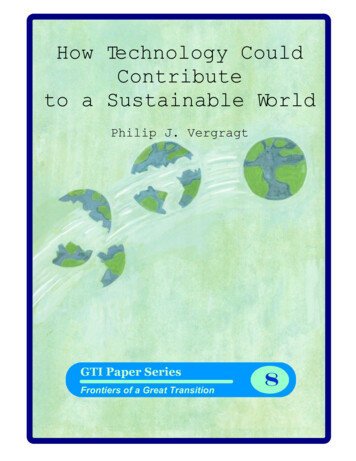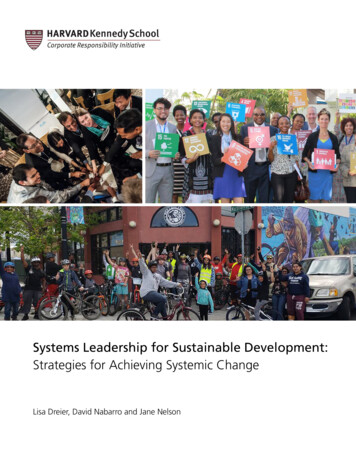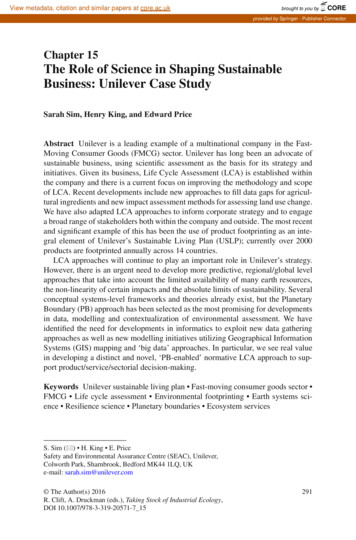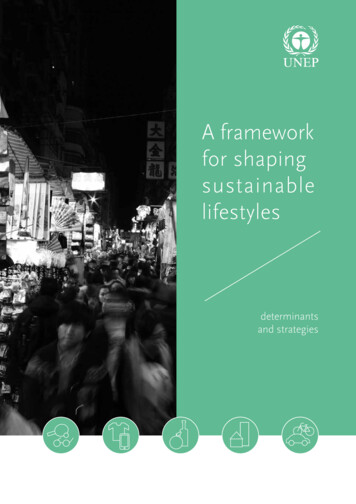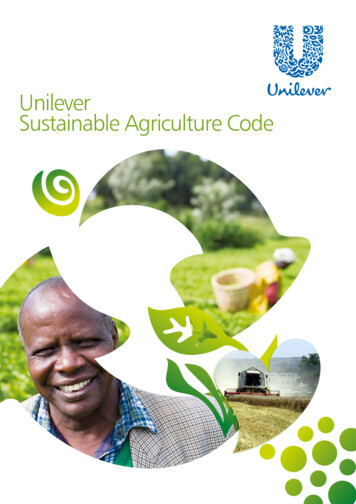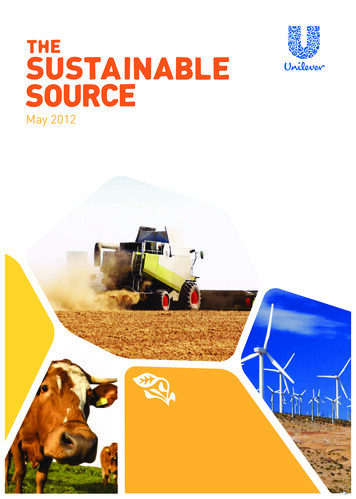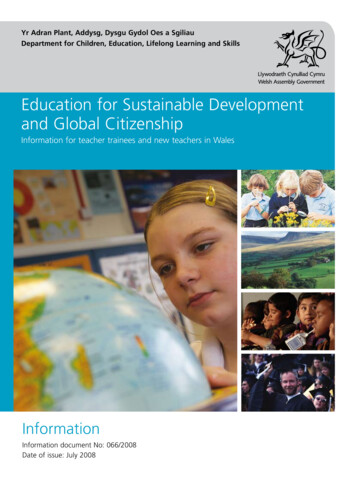
Transcription
Yr Adran Plant, Addysg, Dysgu Gydol Oes a SgiliauDepartment for Children, Education, Lifelong Learning and SkillsEducation for Sustainable Developmentand Global CitizenshipInformation for teacher trainees and new teachers in WalesInformationInformation document No: 066/2008Date of issue: July 2008
Information for teacher trainees and newteachers in WalesAudienceAll higher Education institutions involved in teacher training; UCETCymru; national and local bodies in Wales concerned with Educationfor Sustainable Development and Global Citizenship.OverviewThis is an information document to aid delivery of ESDGC in schools.This document sets out to clarify the Welsh QTS standards relatingto Education for Sustainable Development and Global Citizenship(ESDGC).ActionrequiredNo action required - For information only.FurtherinformationEnquiries about this information document should be directed to:Jane NettletonStrategy UnitDepartment for Children, Education, Lifelong Learning and SkillsWelsh Assembly GovernmentCathays ParkCardiffCF10 3NQTel: 029 2080 1402Fax: 029 2082 6109E-mail: esdgc@wales.gsi.gov.ukAdditionalcopiesFurther copies may be obtained at the above address.This document can also be accessed from the WelshAssembly Government website ls/policy strategyand planning/sustainabledevelop/?lang enRelateddocumentsESDGC action plan 2006ESDGC action plan updated January 2008ESDGC common understanding for SchoolsQTS standards for initial teacher trainingOut of Classroom Learning 2007ISBN 978 0 7504 4789 8 Crown copyright July 2008CMK-22-07-310D1620809Thanks to rspb-images.com forproviding photo 2 on cover
ContentsSummary21What is ESDGC42What do I need to know about ESDGC83Where should I address ESDGC in my professional practice104ESDGC in learning and teaching125Values and Attitudes in ESDGC146Developing Skills in ESDGC157How can you promote some of this in your teaching178Whole school case studies269Planning for your Future2810 Document and Resources29ESDGC: Information forTeacher Trainees andNew Teachers in WalesJuly 2008Information DocumentNo: 066/20081
Summary“Climate change,poverty, conflictand consumerpressure are allpart of our worldtoday. ESDGCseeks to findways to raiseawareness andaction to addressthe consequencesof our lifestylechoices andprepare us forsustainableliving in the21st century asglobal citizens”Jane Hutt, Ministerfor Children,Education andLifelong Learning- Education forSustainableDevelopment andGlobal Citizenship- A Strategy forAction, UpdatedApril 2008This document sets out to clarify the Welsh QTS standardsrelating to Education for Sustainable Development and GlobalCitizenship (ESDGC): It aims to support ITET trainees and new teachers by pointing tothe types of documents which trainee teachers and new teachersshould know about. It suggests ways in which they can approach ESDGC intheir teaching. It looks at the types of strategies which can be used for teachingand learning and at how schools can promote ESDGC throughtheir ethos. It lists some resources and support organisations to help themget started with ESDGC.What’sESDGCall about?July 2008Information DocumentNo: 066/20082Do I haveto call itESDGC?How do myvalues affecthow I dealwith this?Wherecan I findout more?How do Igo aboutESDGC?ESDGC: Information forTeacher Trainees andNew Teachers in WalesDo I knowenough aboutthe issues?What kind ofteaching andlearningstrategies canI use?
What if I will be teaching in England, Scotland orNorthern Ireland?You will find that all these countries have similar themes in theircurricula. These can be found under the titles of Global Dimension,Sustainable Development, Sustainable Schools, Citizenship etc.Some of this information for each country can be found inthe Curriculum section of the Global Dimension websitewww.globaldimension.org.uk. In England “Global Dimensionto new Professional Standards for QTS” should be consulted.ESDGC: Information forTeacher Trainees andNew Teachers in WalesJuly 2008Information DocumentNo: 066/20083
1 What is Education for SustainableDevelopment and Global Citizenship?Education for Sustainable Development and Global Citizenship(ESDGC) is about the things that we do every day. It is aboutthe big issues in the world - such as climate change, trade,resource and environmental depletion, human rights, conflict anddemocracy, - and about how they relate to each other and to us.It is about how we treat the earth and how we treat each other,no matter how far apart we live. It is about how we prepare forthe future. Every one of us has a part to play.“Education is themost powerfulweapon you canuse to changethe world”Nelson MandelaEducation for Sustainable Development and Global Citizenship(ESDGC) is a cross-cutting theme in the revised curriculum forWales 2008 (Making the most of learning, DCELLS, 2008).The key document on ESDGC in Wales, Education for SustainableDevelopment and Global Citizenship: A Common Understandingfor Schools (DCELLS, 2008), emphasises that ESDGC is a holisticapproach to education which: prepares learners for the new challenges that will be part of theirfuture such as climate change and international competitionfor resources helps them to understand the complex, interrelated natureof their world builds the skills that will enable learners to think critically,think laterally, link ideas and concepts such as needs and rightsand uncertainty and precaution, and make informed decisions.It stresses that it should be dealt with across the wholeschool including: Commitment and Leadership Learning and Teaching School Management Partnerships and community Research and monitoringESDGC: Information forTeacher Trainees andNew Teachers in WalesJuly 2008Information DocumentNo: 066/20084
To emphasise the breadth of ESDGC the CommonUnderstanding approaches teaching and learning throughseven interconnected themes:sesoic isionhC ecDndaHealtConsumpt& was iontehClimatechangeThen e nvir atuon rame lntId& enticu tylturean Wead p lthovertyESDGC: Information forTeacher Trainees andNew Teachers in WalesJuly 2008Information DocumentNo: 066/20085
The document emphasises that ESDGC is NOT: a separate subject a series of discrete concepts or topics confined to the classroom the responsibility of just one teacher in the school about transmitting a set of answers to learnersESDGC can motivate children because it provides interesting reallife, topical contexts which learners can relate to, and an excitingopportunity for developing skills. Many of the existing schoolschemes such as EcoSchools, Healthy Schools, Fairtrade schoolsand the various types of international school partnerships contributeto ESDGC.To illustrate the interconnectedness of themes in ESDGC here aretwo examples. In each one theme is in the spotlight and connectionsare drawn to other themes. Try to fill in the second for yourself.Wealth and povertyConsumption and wastePoorer countries emitless CO2 but oftensuffer more fromclimate changeIdentity andcultureImpacts of massmigration as peoplemove because ofclimate changeLifestyle choicesChoices and decisionsESDGC: Information forTeacher Trainees andNew Teachers in WalesJuly 2008Information DocumentNo: 066/20086Impact oftravel andproductionon CO2Climate changeIncrease inMalaria andother diseasesLoss ofbiodiversityThe natural environmentHealth
ESDGC: Information forTeacher Trainees andNew Teachers in WalesJuly 2008Information DocumentNo: 066/20087Identity andcultureChoices and decisionsClimate changeThe natural environmentWealth and povertyHealthConsumption and waste
2 What Do I Need to Know AboutESDGC?Clarifying the QTS StandardsThere are two QTS standards directly addressingESDGC: S2.2 and S3.3.15S2 Professional knowledge and understandingS2.2 National Curriculum aims and guidelinesTo gain QTS, trainees must show that they know and understandthe National Curriculum aims and guidelines, in particular: they are familiar with the most recent national guidanceon the promotion of Education for Sustainable Developmentand Global Citizenship.This guidance on ESDGC includes: Education for Sustainable Development and Global Citizenship:A Common Understanding for schools (DCELLS, 2008). This is thekey Welsh document dealing with ESDGC. It includes definitions,learning outcomes, and practical examples from the key areas. Making the most of learning (DCELLS, 2008) which namesESDGC as an cross-cutting theme throughout the curriculum. The Personal and Social Education Framework (DCELLS, 2008)which contains ESDGC as one of its five themes. National Curriculum subject orders which contain many examplesof ESDGC. Each has a statement on the subject relevance forESDGC in PSE (DCELLS, 2008). The Estyn Inspection guidance for ESDGC Update on inspectingeducation for sustainable development and global citizenshipin schools (Estyn, 2006).ESDGC: Information forTeacher Trainees andNew Teachers in WalesJuly 2008Information DocumentNo: 066/20088
The Out of Classroom Learning document (DECWL 022/2007)which contains many examples of how ESDGC can beapproached through learning in the natural environment. The Welsh Assembly Government’s Education for SustainableDevelopment and Global Citizenship - A Strategy for Action(DELLS, 2006) which shows how ESDGC can be implementedacross all sectors of education.These documents all emphasise that the following are important: the issues with which ESDGC deals i.e. in the seven themes in theEducation for Sustainable Development and Global Citizenship:A Common Understanding for Schools (DCELLS, 2008) the skills, values and attitudes, and knowledge and understandingassociated with ESDGC how our own values and attitudes affect how weapproach ESDGC how our specialist subject contributes to ESDGC the role of ESDGC within PSE how ESDGC can be enhanced by cross-curricular planningand activities how ESDGC can be planned into whole school activities andcontribute to the whole school ethos ESDGC for school and subject leaders methodologies which can be used to promote ESDGC such asexperiential and participative learning, thinking skills, collaborativeand co-operative learning, out-of-classroom learning how ESDGC can be enhanced by out-of-classroom learning how organisations and partnerships can contribute to ESDGC how ESDGC in school can contribute to the community,locally and globallyESDGC: Information forTeacher Trainees andNew Teachers in WalesJuly 2008Information DocumentNo: 066/20089
3 Where should I address ESDGC in myProfessional PracticeS3 Teaching“Once you beginto think in thisway, it becomesunnatural notto include globalissues. You coulddo this kind ofthing in lotsof differentsituationsand themes.”PGCE Primarytrainee“ESDGC hasbrought myteaching alive.The pupils aremotivated andit makes myteaching so muchmore interestingby providingreal contextsfor learning”PGCE PrimarytraineeESDGC: Information forTeacher Trainees andNew Teachers in WalesJuly 2008Information DocumentNo: 066/200810S3.1 Planning, expectations and targetsTo gain QTS, trainees must demonstrate all of the following:S3.3.15 They take appropriate opportunities to promote and teacheducation for sustainable development and global citizenship in allrelevant aspects of their teaching.In doing this you should consider the following: ESDGC in all your subject teaching ESDGC in PSE sessions within and outside of yoursubject teaching working with colleagues to plan and co-ordinate cross-curricularactivities for ESDGC using a range of learning and teaching methodologies using out-of-classroom learning to contribute to ESDGC developing partnerships with relevant individualsand organisations contributing to planning ESDGC in whole school activitiesand ethos contributing to ESDGC activities which benefit communitieslocally and globally
“I had quite a fewopportunities,on schoolpractice. I dida year 8 sessionon Pollution inthe aftermathof the Iraq war,I went to ameeting of theGreen Team,an after schoolclub and alsosat in on a GetGlobal! Projectsession in RE.“Do I have to call it ESDGC?ESDGC activities will crop up naturally in your teaching and theydon’t all have to be labelled ESDGC. However it would be usefulif your students have opportunities to learn and discuss what thewords mean and for you to draw attention to related work doneunder other topics and subjects. In this way they will begin to seethe connections and the bigger picture.PGCE secondarytraineeESDGC: Information forTeacher Trainees andNew Teachers in WalesJuly 2008Information DocumentNo: 066/200811
4 ESDGC in Learning and TeachingHow do I integrate ESDGC in Learning and Teaching?Making the most of learning (DCELLS, 2008) highlights ESDGC asa cross-cutting theme in the revised curriculum for Wales. You willfind opportunities for ESDGC at all levels of education, in all topics,in all subjects, in PSE and the Curriculum Cymreig, in whole schoolactivities and in the way the school works as an institution.Education for Sustainable Development and GlobalCitizenship: A Common Understanding contains examples ofways to develop skills, knowledge and understanding and valuesfor each key stage. You should refer to this for further information.Here are some questions to consider: Does the learning offer past, present and future perspectives? Does the learning address any of the major themes within ESDGCi.e. wealth and poverty, health, climate change, the naturalenvironment, consumption and waste? Does it make interconnections between these themes andbetween people, places and events both locally and globally? Is the learning relevant to learners’ lives? Does it encourage critical examination of issues? Does the learning address controversial issues and examineconflict resolution? Does the learning explore values and cultural perspectives? Does it empower learners to take appropriate action?Teachers today are encouraged to share the learning objectives withtheir pupils at the beginning of the lesson and this would be anappropriate point to note if elements of ESDGC are included in thatparticular lesson. If there is a plenary session, then this again wouldbe an appropriate point to discuss ESDGC with pupils.ESDGC: Information forTeacher Trainees andNew Teachers in WalesJuly 2008Information DocumentNo: 066/200812
Making ESDGC relevant to your pupils’ livesMaking ESDGC relevant to the lives of your pupils makes it moreinteresting and motivating and it will help them to more easilyperceive and understand the world as a complex and interconnected place. Here are some questions and ideas to consider: What links do pupils already have with other places andcountries? For example, do pupils know where their food,clothes, computers, mobile phones and household goods havecome from, how they are made and the impact on people andthe environment? Ask pupils to think about what they have done today to makethe world more sustainable. For example you may get answerssuch as walking to school, turning computers off, buying localproduce, being kind to others.Think of some other ways in which ESDGC can be maderelevant to your pupils.ESDGC: Information forTeacher Trainees andNew Teachers in WalesJuly 2008Information DocumentNo: 066/200813
5 Values and Attitudes in ESDGCTo ensure that ESDGC is NOT about transmitting a set of answersto learners it is important that pupils have access to a range ofmaterials from different perspectives. Critical thinking about issuessuch as poverty cannot begin with a set of assumptions e.g. thatdebt relief and Fairtrade are the solutions. Other possible solutionse.g. free trade, good governance have to be considered. No teacherwould introduce ethical issues such as abortion without making surethat pupils were given views from different perspectives and thesame has to be true for ESDGC.Learners need opportunities to develop their own values thoughinvestigating and assessing evidence, discussing and reasoning,and becoming aware of their own values in relation to those ofothers. Only then will they have a reasoned base for whateveractions they take in relation to ESDGC issues.“Before youfinish eating yourbreakfast thismorning, you’vedepended on halfthe world”.Martin Luther KingAs teachers we need to be aware that our own values are shapedby our experiences and to consider how these will impact onour teaching. We should be facilitators of learning and not beexpecting pupils to accept our own values or a particular set ofvalues. However we should be aware of our potential as positiverole models so that there is not a contradiction between whatwe say and what we do.How do you think your own values affect your teaching?Do you think there are certain fundamental values?How can you avoid imposing your values on pupils?What opportunities do you give your pupils to consider anddevelop their own values?ESDGC: Information forTeacher Trainees andNew Teachers in WalesJuly 2008Information DocumentNo: 066/200814
6 Developing Skills in ESDGCThe Skills Framework (DCELLS, 2008) emphasises the importanceof developing learning rather than merely transferring facts.It promotes teaching approaches such as collaborative learning,active and interactive learning, including questioning, planning,problem-solving, creativity and reflection. It helps to develop thekey skills of thinking, communication, ICT and number.The Education for Sustainable Development and Global Citizenship:A Common Understanding for Schools (DCELLS, 2008) alsoemphasises the need for skills such as thinking critically, thinkinglaterally, linking ideas and concepts and making informed decisions.ESDGC: Information forTeacher Trainees andNew Teachers in WalesJuly 2008Information DocumentNo: 066/200815
What kinds of strategies would a school need to promotethese skills?Which of the strategies below do you think are mostimportant?Uses a variety oflearning strategiesActsdemocraticallyEncourages holistic learningPupil-centredExplores multipleperspectivesEncouragesdialogue anddiscussionEncourages co-operativeand collaborativelearningPromotesopportunities fordecision-makingPromotes self esteem andself awarenessPromotes opportunitiesto take actionDevelops leadership skillsEncourages creativitySees itself as a communityPromotes opportunitiesto think about the futureProvides opportunities forout of classroom learningEncourages respect forthe environmentEncourages participationGives and encouragesresponsiblityMakes connectionsbetween subjects, pupils’lives and the wider worldEncouragesexperimental learningExplores own and othersvalues and attitudesESDGC: Information forTeacher Trainees andNew Teachers in WalesJuly 2008Information DocumentNo: 066/200816Reflects on its actionsIncludes and, values all pupilsand their rightsEncourages inquiry andcritical thinking
7 How Can You Promote Some of thisin Your Teaching?ESDGC hasbrought myteaching alive.The pupils aremotivated andit makes myteaching so muchmore interestingby providingreal contextsfor learning”PGCE PrimarytraineeThere are many learning and teaching strategies which can helpdevelop knowledge and understanding, skills and values in ESDGC.Education for Sustainable Development and Global Citizenship:A Common Understanding for Schools (DCELLS, 2008) gives tablesof learning outcomes and activities for each Key Stage which canenhance ESDGC in the classroom, in the whole school and throughpartnerships. See also the ESDGC section of the Wales National Gridfor Learning www.ngfl-cymru.org.uk for examples.Many NGOs have developed useful, and free, lesson plans andresources for ESDGC. See the teaching resources and websiteslisted at the end of this booklet.The activities described in the following pages will give you someideas for getting started.ESDGC in the Foundation PhaseThe Foundation Phase Framework for Children’s Learning for3 to 7-year-olds in Wales (DCELLS, 2008) offers many opportunitiesfor developing ESDGC. It encourages experiential learning andco-operative play and places emphasis on the holistic developmentof children and their skills across the curriculum. Children’s viewsand opinions are valued, and opportunities to discuss their ownexperiences and ideas about their lives and their futures underpinthe approach. It promotes equality of opportunity and values,and celebrates diversity. The emphasis on outdoor play offers theopportunity for children to develop an appreciation of the naturalworld, to learn to play co-operatively, to make decisions etc.Knowledge and Understanding of the World can be used as thestarting point for learning about people and places and for exploringsimilarities and differences. Creative development will enhance theirability to communicate and express their creative ideas.ESDGC: Information forTeacher Trainees andNew Teachers in WalesJuly 2008Information DocumentNo: 066/200817
SustainableDevelopment andGlobal Citizenshipis one of the fivethemes of PSEESDGC in Personal and Social EducationThe Personal and Social Education Framework for 7 to 19 yearolds in Wales (DCELLS, 2008) takes a broad, balanced holisticapproach to PSE which features a range of experiences to promotethe personal and social development and well-being of learners.This includes all the planned learning experiences and otheropportunities which are features of the ethos and community lifeof the school or college. Sustainable Development and GlobalCitizenship is one of the five themes of PSE, as is Active Citizenshipwhich encourages successful relationships, participation in their localand global community and a practical understanding of their rightsand of the links between political decisions and their own lives.Some Ideas for ESDGC In Subject TeachingAll of the revised National Curriculum subject orders containopportunities for ESDGC and these should be consulted whenplanning activities. There is a statement in each subject order aboutthe relevance of ESDGC. The examples listed below will help youto begin thinking about the relevance of ESDGC to your subject.You should refer to the Education for Sustainable Developmentand Global Citizenship: A Common Understanding for Schools(DCELLS, 2008) for further information on both the scope andcontent of ESDGC.Opportunities for ESDGC within subjects include:ESDGC: Information forTeacher Trainees andNew Teachers in WalesJuly 2008Information DocumentNo: 066/200818English Including stories and texts from various cultures and in local,global and sustainable development contexts. Using discussions, debates, drama and role play to learn moreabout their own identity, experiences of others, the world andtheir place in it, and issues such as democracy and citizenship. Critical evaluation: What is ‘news’? What makes a ‘good story’?Who decides? Analysing advertising. and the impact of media on local,national and global issues.
Using dual language texts to raise awareness of other languagesand countries.Welsh Discussing and learning about the importance of their ownculture, about the differences in Welsh culture - North/South,urban/rural etc, and about the diversity of other cultures in Wales; Including stories and texts from various cultures and in local,global and sustainable development contexts; Using discussions, debates, drama and role play to learn moreabout their own identity, experiences of others, the world andtheir place in it, democracy and citizenship. Vision a future Wales.CATMathematics Exploring shapes and patterns from a variety of cultures; Discussing the origins of mathematics - what differentcultures have contributed to development and applicationof mathematics; Applying maths to real life problems based on 21st century issuese.g. Using/handling data about other countries, global issues,using of graphs to record energy consumption, poverty anddevelopment statistics etc.Pupils visited theCentre for AlternativeTechnology andexplored renewablesources of electricity.Science Comparing the needs of living things and the importanceof biodiversity. Doing science and environmental work outdoors. Examining interrelationships in communities - interdependence. Learning about the earth in space - significance, size etc. Discussing the nature of science, moral dilemmas in science. Exploring scientific and technological developments on localand global scales. Debating nuclear energy use.ESDGC: Information forTeacher Trainees andNew Teachers in WalesJuly 2008Information DocumentNo: 066/200819
It has made memore aware thatscience can beused as a toolfor EGSDC. I willdefinitely keepthinking about it.PGCE secondarytrainee Exploring properties of materials in relation to sustainabilitye.g. Learning about mass/energy conservation, recyclable,renewable materials, energy and resources use in recycling. Learning and discussing global warming and other impactson the atmosphere. Exploring low carbon futures, personally, locally, nationallyand globally. Learning about renewable and non-renewable energy resources.Design and Technology Using of recycled and renewable resources in design andmake activities. Considering needs and wants. Considering different cultures, ethnicity, dietary preferences,religious beliefs, when designing and making food products,greetings cards etc. Considering sustainable product design e.g. choice ofmaterials and the relative benefits of re-using, recycling andbiodegradability. Considering product packaging and sustainability issues. Considering classroom, playground & school design. Discussing the use of Fair-Trade products, impact of processing,food miles & locally produced food. Considering design influences from a variety of countriesand societies. Discussing how technology can be used to improve people’squality of life, locally and globally.ICT Exploring the potential of ICT for learning more about,and communicating with, people from other cultures andsocieties; Discussing the effect of ICT on language and cultures. Exploring energy implications and other impacts of ICT. Using ICT applications to aid in decision-making activities.ESDGC: Information forTeacher Trainees andNew Teachers in WalesJuly 2008Information DocumentNo: 066/200820
Handling of data about global issues e.g. population,refugees etc. Disposal/recycling of hardware.Geography Observing and asking questions: where is it, what is it like,how did it get like this, how is it changing, what might happennext, what do I think about it? Noting similarities and differences. Recognising the importance of the environment. Using Out of classroom learning - visits, surveys etc. Discussing how people across the world are linked(interdependent) - food, clothes, fuel, environment etc. Taking part in international school partnerships and links andusing them to explore opinions and responses to issues such asclimate change and trade. Holding role plays and debates about sustainable developmentand global issues. Playing simulation games on food and farming, global tradingand comparing issues of free trade, fair trade, unfair trade. Exploring economic, social and environmental aspects of issuesthat affect communities in Wales. Discussing the importance of the environment, people’s effecton environment; caring for environment. Discussing preferable, possible and probable futures. Exploring global warming and climate change impacts.ESDGC: Information forTeacher Trainees andNew Teachers in WalesHistory Comparing life in the past with life today and life in anothersociety today. Comparing where foods and materials came from, and comefrom today. Considering the impact of people on the environment anddevelopment in different times. Comparing daily life of two contrasting periods and what life waslike for rich and poor. Looking at links across ages and links of the past with today.July 2008Information DocumentNo: 066/200821
“Key Stage 2pupils visitedan exhibition onthe transatlanticslave trade inPenrhyn Castleas part of theirstudy of historicaland present-daylinks betweenthe north Walesquarry areaand Jamaica.” Finding out about the history of democracy and human rights. Considering political, social, environmental, economic andcultural aspects of Wales as part of the world. Considering different views and interpretations of peopleand events.Art Exploring expression of feelings through art. Learning about Welsh artists/world artists and their motivation. Using natural, reused, reclaimed and sustainable materials. Exploring and observing art from/in nature. Exploring diversity, richness of other societies and cultures.Music Music and emotions. Exploring the contribution of world music to popular culture. Exploring music from people’s revolutions, songs to expressfeelings. Singing and composing songs about global issues. Exploring Music as a response to environment.Physical Education and outdoor education Learning about of the value of play and of exercise for healthyliving and social functions. Learning to appreciate the value of working co-operatively. Exploring ways of overcoming difficulties, development ofself esteem and confidence. Discovering the influence of other dance forms and gamesfrom other countries; richness of other societies. Walking and cycling to school. Learning to appreciate the environment and act sustainably. Finding out about sports people from different countries,their motivations and experiences.ESDGC: Information forTeacher Trainees andNew Teachers in WalesJuly 2008Information DocumentNo: 066/200822Religious Education Exploring issues within and between faiths, and understandingthe influence of beliefs, values and traditions on individuals,societies, communities and cultures.
Considering questions of meaning and purpose in life.Learning about religious and ethi
choices and prepare us for sustainable living in the 21st century as global citizens” Jane Hutt, Minister for Children, Education and Lifelong Learning - Education for Sustainable Development and Global Citizenship - A Strategy for Action, Updated April 2008 Do I know enough about the is



